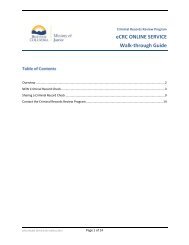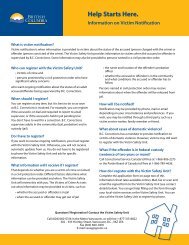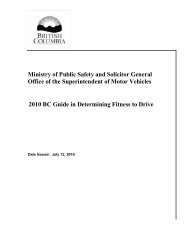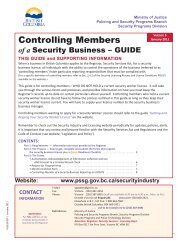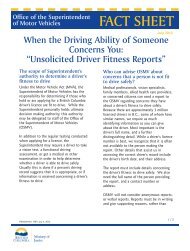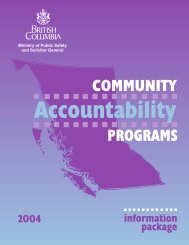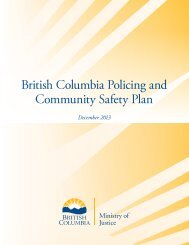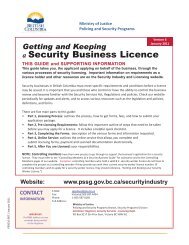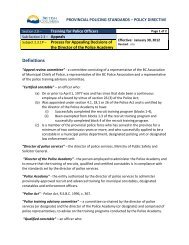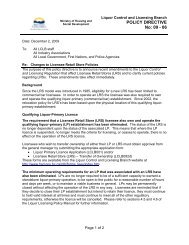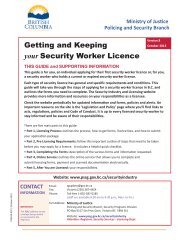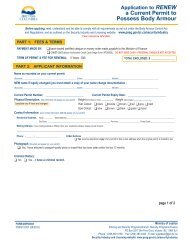UBrew/UVin Licence terms and conditions guide
UBrew/UVin Licence terms and conditions guide
UBrew/UVin Licence terms and conditions guide
- No tags were found...
Create successful ePaper yourself
Turn your PDF publications into a flip-book with our unique Google optimized e-Paper software.
IntroductionThis GuideThis <strong>guide</strong> outlines the requirements of the Liquor Control <strong>and</strong> Licensing Act <strong>and</strong> Regulations foroperating <strong>UBrew</strong> or <strong>UVin</strong> stores. It also imposes further <strong>terms</strong> <strong>and</strong> <strong>conditions</strong>, in addition to thosefound in the Liquor Control <strong>and</strong> Licensing Act <strong>and</strong> Regulations.*Like the requirements contained in the Act <strong>and</strong>Regulations, these additional <strong>terms</strong> <strong>and</strong> <strong>conditions</strong> –<strong>and</strong> any further <strong>terms</strong> <strong>and</strong> <strong>conditions</strong> that might beprinted on the face of your licence or contained inletters issued to you by the general manager of theLiquor Control <strong>and</strong> Licensing Branch – must befollowed at all times.Important!Please take time to read this <strong>guide</strong> carefully <strong>and</strong> makesure your managers <strong>and</strong> staff are familiar with theinformation presented here, <strong>and</strong> with any additional <strong>terms</strong><strong>and</strong> <strong>conditions</strong> printed on the face of your licence <strong>and</strong>/orin letters issued by the Liquor Control <strong>and</strong> LicensingBranch.As a licensee, it is your responsibility to operate your business so that it complies with the law <strong>and</strong>with the <strong>terms</strong> <strong>and</strong> <strong>conditions</strong> of your licence.*Section 12.1 of the Liquor Control <strong>and</strong> Licensing Act provides the general manager with the authority toimpose, in the public interest, <strong>terms</strong> <strong>and</strong> <strong>conditions</strong> on licences.Definitions Used in This Guide“The Act” means the Liquor Control <strong>and</strong> Licensing Act, the provincial legislation that <strong>guide</strong>s thelicensing of establishments that manufacture, store or sell liquor in B.C.“The branch” means the Liquor Control <strong>and</strong> Licensing Branch, the government agency thatadministers the Act.“The general manager” means the general manager of the Liquor Control <strong>and</strong> Licensing Branch.“Licensee” refers to any individual, individuals, corporate body or society thatholds a British Columbia liquor licence.“Manufacturer” means a manufacturer of liquor products (i.e., beer, wine, spirits,cider <strong>and</strong> coolers) or the corporate official of a liquor manufacturer.“Terms <strong>and</strong> <strong>conditions</strong> of licence” are requirements of licensees that are set bylegislation, regulation or branch policy. All <strong>terms</strong> <strong>and</strong> <strong>conditions</strong> must befollowed. Not following them may result in enforcement action.Please Note:Wherever definitions,words or expressionsused in the <strong>guide</strong> differfrom the wording of theLiquor Control <strong>and</strong>Licensing Act <strong>and</strong>Regulations <strong>and</strong> theLDB Act, the legislationwill prevail“<strong>UBrew</strong>/ <strong>UVin</strong>” is a licensed business that provides its customers with the ingredients, equipment <strong>and</strong>advice they need to make their own beer, wine, cider or coolers for their own private consumption,away from the <strong>UBrew</strong>/<strong>UVin</strong> premises.<strong>UBrew</strong>/<strong>UVin</strong> 6Terms <strong>and</strong> Conditions
Background: Who isResponsible for WhatThe Liquor Control <strong>and</strong> Licensing BranchThe Liquor Control <strong>and</strong> Licensing Branch is responsible for regulating <strong>and</strong> monitoring the manufacture<strong>and</strong> sale of liquor in licensed establishments in British Columbia, <strong>and</strong> for protecting the public from theharm that may be caused by making <strong>and</strong> selling liquor or products that contain liquor.The branch issues liquor licences <strong>and</strong> supervises the activities of all liquor licensees in BritishColumbia to make sure they are following the rules laid out in the Liquor Control <strong>and</strong> Licensing Act, itsregulations, <strong>and</strong> their licence <strong>terms</strong> <strong>and</strong> <strong>conditions</strong>.To make sure the public has full access to information about liquor licensees in this province, we post,on our branch web site, summaries of all cases where a liquor inspector has recommendedenforcement action. For those cases that go to an enforcement hearing, we post the complete text ofthe decision. (Names of individuals have been removed to comply with the requirements of theFreedom of Information <strong>and</strong> Protection of Privacy Act.)Your Role as a LicenseeAs a licensee (someone who holds a liquor licence), you must let the branch know about any changesyou make to your business or to the buildings you operate.You are legally responsible for underst<strong>and</strong>ing how the Act, its Regulations, <strong>and</strong> the specific <strong>terms</strong> <strong>and</strong><strong>conditions</strong> of your licence affect the operation of your establishment, <strong>and</strong> for complying with the Act,its Regulations, <strong>and</strong> the <strong>terms</strong> <strong>and</strong> <strong>conditions</strong> of your licence <strong>and</strong> all catering authorizations (if youhave a catering endorsement).You are also responsible for making sure your employees follow B.C.’s liquor laws <strong>and</strong> the <strong>terms</strong> <strong>and</strong><strong>conditions</strong> of your licence, even when you are not on site.RevisedOctober2013You <strong>and</strong> your staff must fully cooperate with liquor inspectors <strong>and</strong> police, <strong>and</strong> ensure the actions ofyou <strong>and</strong> your staff do not put liquor inspectors, minor agents contracted to the branch, or police at riskor prevent them from carrying out their duties.Drawing the attention of patrons to the fact that liquor inspectors, minor agents contracted to thebranch, <strong>and</strong>/or police are present in your establishment may put the safety of the inspectors, minoragents contracted to the branch, <strong>and</strong> police at risk. Accordingly, your actions must not cause theattention or focus of patrons to shift towards inspectors, minor agents contracted to the branch, orpolice at any time; including at the time of entry, during an inspection, or when exiting yourestablishment. Actions such as announcing the arrival of inspectors, raising or flashing lights, turningdown music, playing particular soundtracks (e.g. “Bad Boys”), using spotlights, or any other similaractions are not permitted. You may not save or distribute photographs of inspectors or minor agentscontracted to the branch in any manner (e.g. on a staff bulletin board or the internet).If you do not carry out your legal responsibilities, you could face serious penalties, includingthe suspension or loss of your licence.<strong>UBrew</strong>/<strong>UVin</strong> 8Terms <strong>and</strong> Conditions
The Role of the Liquor InspectorLiquor Control <strong>and</strong> Licensing Branch liquor inspectors are located in regional offices across theprovince. They may make unannounced visits to your <strong>UBrew</strong>/<strong>UVin</strong> at any time to:• explain the <strong>terms</strong> <strong>and</strong> <strong>conditions</strong> of your licence• inspect your legal, financial <strong>and</strong> business records• observe <strong>and</strong> record your business practices, identifying gaps or weaknesses that are likely to leadto non-compliance, <strong>and</strong>• identify any contraventions of the Act, regulations or the <strong>terms</strong> <strong>and</strong> <strong>conditions</strong> of the licenceoccurring in your establishment.If a liquor inspector finds a licensee is contravening (not following)the Act, its regulations or the licence <strong>terms</strong> <strong>and</strong> <strong>conditions</strong>, theinspector will issue a contravention notice <strong>and</strong> may recommendenforcement action. (Please see the later sections of this <strong>guide</strong> formore on inspections <strong>and</strong> enforcement.)The Role of PolicePolice officers may also make unannounced visits to your <strong>UBrew</strong>/<strong>UVin</strong> at any time.Please note:Liquor inspectors are a goodresource. They can provide you withboth help <strong>and</strong> advice, <strong>and</strong> werecommend you get to know yourlocal liquor inspector as soon aspossible.When the police walk through your establishment, they will look for evidence of any liquorcontraventions, especially those that could result in disturbances within the community or that couldthreaten public safety, such as minors in possession of alcohol. If the police notice a contravention,they will record it on a form called a Licensed Premises Check (LPC), leave one copy with you <strong>and</strong>send one to the Liquor Control <strong>and</strong> Licensing Branch.The branch follows up on all LPCs, <strong>and</strong> may ask a liquor inspector to conduct a further inspection. Ifthe inspector confirms the contravention, he or she will issue a Contravention Notice <strong>and</strong> mayrecommend enforcement action.The Role of Local Government <strong>and</strong> First NationsA liquor licence is only one requirement in opening a licensed establishment in British Columbia.Liquor licensees must also deal with local governments on such issues as zoning, building bylaws,business licensing requirements <strong>and</strong> health <strong>and</strong> fire regulations.Local governments are responsible for protecting the peace <strong>and</strong> good order of their communities <strong>and</strong>are often the first to learn about problems relating to licensed establishments. The general managertakes complaints from local governments that licensed establishments are operating contrary to thepublic interest <strong>and</strong> are disturbing people in the surrounding area very seriously.<strong>UBrew</strong>/<strong>UVin</strong> 9Terms <strong>and</strong> Conditions
Managing Your BusinessPosting Your <strong>Licence</strong>You must post your liquor licence certificate in a prominent location in the licensed area to ensure it isimmediately available for review by liquor inspectors <strong>and</strong> police.Renewing Your <strong>Licence</strong>You must renew your licence each year by March 31st, <strong>and</strong> pay an annual licence fee. The annual feefor a <strong>UBrew</strong>/<strong>UVin</strong> liquor licence is $750.Providing Information to the BranchYou must be forthright in providing information to the branch. Making a misleading statement or failingto disclose a material fact (such as the fact that a third party is using your licence, that shares havebeen transferred or that the lease on your property is about to run out) are licensing contraventions.Keeping RecordsAs a <strong>UBrew</strong>/<strong>UVin</strong> licensee, you must:RevisedOctober2013maintain records of all ingredients purchased for use in the production of beer, wine, cider <strong>and</strong>coolers in your establishment. Records must indicate the source <strong>and</strong> volume of the ingredientsmaintain records of all sales, invoices <strong>and</strong> customer declaration forms (see the section onCustomer Responsibilities for more about declarations)keep a record of the volume of beer, wine, cider <strong>and</strong> wine coolers produced in your facility in thepreceding twelve-month period.You will have to provide this information to the branch when you renew your licence each year.Maintain records of the type <strong>and</strong> volume of beer, wine, cider <strong>and</strong> wine coolers produced by you<strong>and</strong> your employeesMaintain records of the disposition of any beer, wine or cider that is spoiled, spilled, unclaimed orreturnedkeep all records for a period of three years (prior to the current business year), <strong>and</strong> make themavailable upon request to branch staff or a person designated by the branch.Making Changes to Your Liquor <strong>Licence</strong>The details of your liquor licence application – who you are, the location of your <strong>UBrew</strong>/<strong>UVin</strong>, etc. –are critical factors in the decision to grant a licence.Any changes you intend to make to these factors after your licence is granted must be approved bythe branch before you make the changes. (Please see Appendix 2 for detailed information aboutmaking changes to your licence.)Selling Your Store <strong>and</strong> Transferring Your <strong>Licence</strong> to a NewOwnerIf you wish to sell your store <strong>and</strong> transfer your licence to a new owner, the new owner will need tocomplete the Application for a <strong>UBrew</strong>/<strong>UVin</strong> <strong>Licence</strong> form (available from the branch web site), <strong>and</strong><strong>UBrew</strong>/<strong>UVin</strong> 10Terms <strong>and</strong> Conditions
attach the appropriate documentation. The application form explains the documentation <strong>and</strong>/orapprovals required.As the current licensee, you will need to sign the Agreement to Transfer <strong>Licence</strong>(s) section of thatform — this is where you officially agree that when the general manager approves the transferapplication, you will relinquish all claims to your licence(s). You also acknowledge that you willcontinue to be held responsible for any contraventions that occur until the transfer is approved.The general manager may decide not to approve a licence transfer if the branch is in the process oftaking enforcement action against you as the current licensee, or if you have not paid a monetarypenalty or served a suspension notice.Hours of SaleYour <strong>UBrew</strong>/<strong>UVin</strong> may be open to the public between the hours of 9:00 am <strong>and</strong> 11:00 pm.MinorsMinors are allowed in the retail part of your <strong>UBrew</strong>/<strong>UVin</strong> unless you choose to set a house policy thatprohibits the entry of minors into your establishment.You may employ minors in your store provided they are under your ongoing supervision or thesupervision of an adult employee <strong>and</strong> are not left alone in charge of the establishment.Except for minors who are employees, minors are not permitted in the areas of your store whereliquor is manufactured or stored unless accompanied by a parent orguardian, <strong>and</strong> may not manufacture liquor at your store or assist a parent orguardian in the production process.ID RequirementsYou must demonstrate that you are preventing minors from obtaining liquor.When verifying a customer’s age, you <strong>and</strong> your employees must ask for twopieces of identification. The first piece of identification must:• be issued by a government agency (e.g. a passport or driver’s licence),<strong>and</strong>• include the person’s name, birth date <strong>and</strong> picture.The second piece must:• include an imprint of the holder’s name (e.g. a credit card, Care Card), <strong>and</strong>• include the person’s signature <strong>and</strong>/or picture.The purpose of this second piece of ID is to verify the authenticity of the first.To verifyidentification, ask theperson for:• A sample signature tocompare to the signature onthe photo identification.• His or her zodiac sign –people with falseidentification often will beunable to answer quickly.• His or her middle name <strong>and</strong>how to spell it.• Information that is on theidentification, such as theperson's address or postalcode..Examples of ID issued by a government agency include state or provincial driver licences, passports,citizenship cards, First Nations status card, the federal firearms possession <strong>and</strong> acquisition licence,National Defence ID – essentially any government issued ID that includes the person's name, birthdate <strong>and</strong> picture. Any of these ID cards can be used as a secondary piece of identification as well. Itmust also be noted that the law does not require that an expiry date be checked for any of these ID.<strong>UBrew</strong>/<strong>UVin</strong> 11Terms <strong>and</strong> Conditions
As of February, 2013, a new BC Services card has come into circulation. This card replaces <strong>and</strong>combines the original BC driver licence <strong>and</strong> health care cards into one identification card. Thetransition will be complete by 2018. There will be a separate BC Services card for those individualsthat choose not to drive. The Care Card has been cited as the most used form of secondary ID,raising concerns about its loss in this regard.However, in addition to the types of cards listed above there are numerous other forms of secondaryID available that include the person’s name, signature <strong>and</strong>/or picture. Some examples include manytypes of bank cards, pleasure craft operator’s card, Aeroplan cards (but not airmiles), many universityor college student IDs, credit cards, BC Transit Pro Passes, Canadian Blood Services plastic blooddonor cards <strong>and</strong> more.If the person cannot produce two pieces of acceptable identification that proves they are 19 or older,you must refuse service.You must cooperate with a liquor inspector if the inspector asks you or your staff to determine whethera person is a minor.You are encouraged (but not required) to retain identification that is clearly false <strong>and</strong> to turn it over toyour liquor inspector. If you suspect that a passport is fake please provide details to police, but do nottake possession of it from the customer. Holding back a valid passport is a federal offence. Wherepossible, the inspector will return the identification to the agency that issued it. (If the patron insistsyou return the ID, you should do so, but we encourage you to take a photocopy of it first to give toyour liquor inspector.)<strong>UBrew</strong>/<strong>UVin</strong> 12Terms <strong>and</strong> Conditions
Each customer must:Customer Responsibilities• Pay for all of the ingredients prior to starting the manufacturing process. At a minimum, thepayment must be for the cost of the ingredients as this is a necessary step to transfer ownershipof the product from you to your customer. You may, if you wish, require payment of the service feeat this time or wait until the product is to be bottled. If the customer brings his or her owningredients into your establishment, you must require paymentof the service fee before beginning the manufacturing process. Sample Declaration:• Sign a declaration saying that he or she is using the productfor personal use or for use at no charge by others, such asfriends <strong>and</strong> family. The declaration should be printed either onthe invoice or on a separate piece of paper attached to theinvoice <strong>and</strong> should be of a font size clearly legible by yourcustomers, with a typeface at least 11 pt. or larger. You mustretain the declaration for audit purposes.I, ____________ on thisdate_________ have purchased theingredients <strong>and</strong> started thefermentation in order to produce thisproduct for my own personal use or byothers at no charge.I authorize the operator to hold thisproduct, under contract of bailment,until my return to bottle <strong>and</strong> remove thesaid product from the facility.• Add the ingredients necessary to start the fermentation process. The degree of customerinvolvement will vary depending on the type of product being manufactured <strong>and</strong> the form it takes.For example:RevisedJune2014• Beer/Wine/Cider kits: The customer must pour the juice/concentrate into the fermentation vessel<strong>and</strong> add water (if required), yeast <strong>and</strong> any other necessary ingredients to the fermentation vessel.• Juice barrels: The customer must add the yeast <strong>and</strong> any other necessary ingredients to thebarrel.• Beer in kettles: The customer must add the necessary ingredients (hops <strong>and</strong> malt extract) to thewater in the kettle, let it cook <strong>and</strong> add yeast.• Pre-made wort under Federal Wort <strong>Licence</strong>: The customer must add yeast to the wort (which isprepared by you).• Commercially available pre-packaged wort kits: Same as for beer/wine/cider kits.At a subsequent visit to your <strong>UBrew</strong>/<strong>UVin</strong>, each customer must:• Wash <strong>and</strong> sterilize bottles. (This step can be performed off-site as well.)• Remove or deface any commercial winery or brewery labels on bottles.Defacing must include, at a minimum, putting a clearly visible <strong>and</strong>permanent dark felt pen marking across the label.• Bottle <strong>and</strong> seal the product started by the customer during an earliervisit.Please Note:The term “bottle” refers toany container, including akeg.There are no restrictions onthe size, sale or rental ofbottles / containers.Customers may bring theirown bottles/ containers orbuy/rent their own bottles.• Affix labels or other decorative items to bottles, if any.• Remove the product from your <strong>UBrew</strong>/<strong>UVin</strong> store immediately after bottling. Bottled product maynot be left on the premises for any reason, <strong>and</strong> you are not permitted to deliver a customer’s beer,wine, cider or coolers.<strong>UBrew</strong>/<strong>UVin</strong> 13Terms <strong>and</strong> Conditions
Outside AssistanceThe customer may ask for help during the production process from someone not associated with youor your staff (friends <strong>and</strong> family of legal age, for example, may accompany the customer to help himor her complete the required steps).If the customer is physically incapable of safely performing some of the steps outlined below, you mayprovide greater assistance. However, we recommend that you tell the customer to bring a friend orfamily member to help next time.<strong>UBrew</strong>/<strong>UVin</strong> 14Terms <strong>and</strong> Conditions
Your ResponsibilitiesAfter a Customer’s First VisitYour main responsibility in the production process is to ensure that your customers fulfil theirresponsibilities.After a customer has completed his or her first visit, you may oversee the fermentation, filtration,racking <strong>and</strong> aging of the product <strong>and</strong> get it ready for bottling. (Your customers do not have to beinvolved in these steps, although they may be if you wish.)AssistanceYou or your staff may help a customer by:• holding the fermentation vessel while the customer pours in the ingredients• transferring the wort to the fermentation vessel• demonstrating the bottling mechanism <strong>and</strong> process by filling one bottle for the customer• demonstrating the corking/capping mechanism <strong>and</strong> process by corking/capping one bottle for thecustomer• demonstrating the labelling <strong>and</strong> shrink-topping procedures by labelling <strong>and</strong> shrink-topping onebottle for the customer• h<strong>and</strong>ing empty bottles to the customer while he or she fills the bottles• placing the filled bottles in cases• carrying the bottled product to the customer’s vehicle.InvoicesAt the time of a customer’s first payment, at his or her first visit, you must provide the customer withan invoice <strong>and</strong> retain a copy for audit <strong>and</strong> inspection purposes. The invoice must include:• the customer’s name <strong>and</strong> telephone number• the type <strong>and</strong> quantity of beer, wine, cider or coolers to be made• the date <strong>and</strong> the amount of payment received from the customer, <strong>and</strong>• the name, address <strong>and</strong> telephone number of your establishment.Carboy TagsYou must attach a carboy tag or label to every carboy, fermentation vessel <strong>and</strong> barrel that clearlystates the customer’s real name (not an alias such as “Champagne Charlie”), date that the productwas started, <strong>and</strong> customer invoice number. You may also choose to include racking dates on thecarboy tag.Barrel AgingYou may offer a barrel-aging service within your <strong>UBrew</strong>/<strong>UVin</strong> where more than one customer’sproduct is placed in a barrel for aging after fermentation.When you empty the barrel, you must pour the product back into carboys, <strong>and</strong> the customers mustthen return to the facility <strong>and</strong> complete all of the remaining steps such as bottling.<strong>UBrew</strong>/<strong>UVin</strong> 15Terms <strong>and</strong> Conditions
You must also affix to the barrel the carboy tags of every customer whose product is stored in thatbarrel.Topping UpBecause some wine may be lost during the racking process, some <strong>UVin</strong> operators in the past have“topped up” “a customer’s wine (added wine that was not made by the customer to a customer’scarboy).This practice is not permitted. It puts you in the position of being an unlicensed manufacturer, <strong>and</strong> isnot required to produce wine.You may top up a customer’s product with a non-alcoholic substance such as water, or the customermay bring his or her own wine to top up his or her own product (the customer may not leave the winefor you to add at some later point).The wine used by a customer for topping up can be product made previously at a <strong>UVin</strong> by thecustomer or commercially produced wine.Fortifying Port <strong>and</strong> SherryA customer may add distilled alcohol (br<strong>and</strong>y or vodka, for example) purchased from a liquor store toport <strong>and</strong> sherry being made at your store immediately prior to bottling.You may not provide the distilled alcohol, <strong>and</strong> the customer may not leave it on-site for you or yourstaff to add to the product.Customer SamplingCustomers may sample their own product prior to bottling to ensure taste acceptability.Each customer may have up to two samples, each not exceeding 100ml or approximately threeounces per batch (200ml is the maximum sample per batch, regardless of the number of personsmaking the batch).It is your responsibility to ensure that customers do not consume quantities greater than this amount.Public SamplingBecause you are not a licensed liquor manufacturer, you may not provide samples of finished productto the public either within your establishment or elsewhere. (This restriction does not apply to thenormal exchange or giving of product to friends or family outside your store in a social setting devoidof commercial considerations or intent.)You may not permit sampling parties in your establishment where kit manufacturers or others –including customers – provide finished product to the public.Trading Racks <strong>and</strong> Product Exchange“Trading racks” – where a customer leaves some of his or her product in the licensed establishmentafter bottling <strong>and</strong> takes another customer’s product left behind in exchange – are not permitted. (Youare not allowed to store bottled product on-site.)<strong>UBrew</strong>/<strong>UVin</strong> 16Terms <strong>and</strong> Conditions
You also may not organise, post, or permit to be posted in your establishment any notices or lists thatencourage product trading among your customers or which provide an opportunity for customers toplace their names <strong>and</strong> telephone numbers on a trading list.You may display a sign-up board or similar device where customers interested in manufacturing aparticular product can contact other interested persons to start <strong>and</strong> share a batch.Group BatchesIf a group of people want to produce liquor together, the group may either split a single batch or morethan one person may make several batches.In either case, all of the customers who will take ownership of the product must:• visit your store <strong>and</strong> be involved in all the “first visit” steps of the production process• have their names stated on the invoice, <strong>and</strong>• sign a declaration.(Without these steps, the customer or customers making the product would be in the position ofillegally selling finished liquor.)At least one member of the group must return to bottle the product. After bottling, the members of thegroup may divide the product among themselves while on-site.Groups may not enter into a co-operative or club arrangement whereby members bottle <strong>and</strong> takeaway product that was started by other members of the cooperative or club.You may not invite customers to participate in a group batch organized by your establishment.Employee BatchesYou <strong>and</strong> your staff may make beer, wine, cider or coolers on-site for your own consumption, provided:• you prepare an invoice (even if there is no charge) <strong>and</strong> keep a record of the production• your carboy tags are visually different (a different colour, for example) from those of your regularcustomers• you make your product during the normal licensing hours of 9:00 am to 11:00 pm (you may,however, make your own product within these hours even if the store is not open to the public)• you do not consume your product on-site (beyond the tasting limits outlined in this <strong>guide</strong>), <strong>and</strong>• once bottled, you remove the product from the premises.Unclaimed ProductIf a customer does not return to your facility to bottle <strong>and</strong> remove the product he or she has made, youmust make a reasonable attempt to contact the customer. If, after a reasonable interval, you stillcannot reach the customer, you may destroy the product.Customer ReturnsIf a customer returns product that is not satisfactory, you may provide the customer with theopportunity to make a free or discounted batch of product, provided:• the customer repeats all of the required production steps<strong>UBrew</strong>/<strong>UVin</strong> 17Terms <strong>and</strong> Conditions
• you prepare an invoice (even if there is no charge) <strong>and</strong> keep record of the production• the customer signs a new declaration• you affix a carboy tag to the fermentation vessel, <strong>and</strong>• you or your staff destroy the unsatisfactory product.You may not, under any circumstances, provide the customer with finished product that the customerdid not produce to replace a batch that the customer returned.StorageYou must store all product on site. The federal Excise Act does not allow you to operate a secondarystorage site.<strong>UBrew</strong>/<strong>UVin</strong> 18Terms <strong>and</strong> Conditions
InspectionsWhy We Inspect Licensed EstablishmentsBranch liquor inspectors conduct regular, unannounced inspections of licensed establishments tomake sure licensees are following the Act <strong>and</strong> Regulations <strong>and</strong> their licence <strong>terms</strong> <strong>and</strong> <strong>conditions</strong>,<strong>and</strong> to make sure there are timely consequences when they don’t.In addition, a liquor inspector may conduct an inspection:• in response to a complaint from a member of the public, another licensee, a local government/FirstNation, police or any other agency, or• to follow-up on a Licensed Premises Check (LPC) issued by a police officer.Entry of Liquor Inspectors <strong>and</strong> Police OfficersIt is your responsibility as a licensee to fully cooperate during inspections. You must give liquorinspectors <strong>and</strong> police officers immediate access to all areas of your <strong>UBrew</strong>/<strong>UVin</strong> on request. A liquorinspector will show you their official identification if you request; however, you must not do anything toimpede a liquor inspector’s or peace officer’s entry into your establishment. You must not requestpersonal identification, scan identification, photograph, w<strong>and</strong>, pat down, or search inspectors orpolice. It is a serious contravention to refuse or delay in any way providing access to an inspector orpolice officer, <strong>and</strong> may result in your liquor licence being cancelled.Producing Documents <strong>and</strong> RecordsYou must allow the general manager (or a designated person such as a liquor inspector) to inspectdocuments <strong>and</strong> records associated with your store, including:• product sales records• purchase <strong>and</strong> disposal records• sales records, invoices <strong>and</strong> purchase receipts• lease <strong>and</strong> management contracts related to your licensed establishment• employee records• any court orders or judgements against you.Liquor Seizures <strong>and</strong> SamplingBoth liquor inspectors <strong>and</strong> the police have the authority to seize liquor that they believe might beunlawfully possessed or kept at a licensed establishment. They will either destroy the liquorimmediately or hold it in storage for 30 days.If you believe your liquor was wrongly seized, you must apply in writing to the General Manager of theLiquor Control <strong>and</strong> Licensing Branch for either the return of the liquor or monetary compensationwithin 30 days from the date of seizure. The claim must demonstrate to the General’s Manager’ssatisfaction that the liquor was lawfully possessed or kept for lawful purposes.If the General Manager is satisfied that the liquor was lawfully possessed, the liquor will either bereturned to you or you will be compensated for the retail list price of the destroyed liquor.<strong>UBrew</strong>/<strong>UVin</strong> 21Terms <strong>and</strong> Conditions
If no application is made within 30 days, or if the General Manager is not satisfied on a claim for returnof seized liquor that the liquor was lawfully possessed or kept, the liquor <strong>and</strong> packages containing itwill be forfeited to the government.Liquor inspectors may also take reasonable samples of liquor found in a licensed establishment orliquor storage area to determine whether the liquor is illegal, unauthorized, adulterated orcontaminated. An inspector does not need evidence that the Act or Regulations have been breachedto take a sample.<strong>UBrew</strong>/<strong>UVin</strong> 22Terms <strong>and</strong> Conditions
EnforcementContravention NoticeIf a liquor inspector believes that you or your staff are contravening theAct, its Regulations or the <strong>terms</strong> <strong>and</strong> <strong>conditions</strong> of your licence, theinspector must issue a Contravention Notice to you, that identifies thealleged contravention.The inspector will then reviewthe evidence <strong>and</strong> circumstances of the contravention in conjunctionwith the Liquor Control <strong>and</strong> Licensing Branch’s file for yourestablishment. Based on that review, the inspector will decide whetherto recommend that the general manager take enforcement actionagainst you, as the licensee.If the inspector does not recommend enforcement action, he or shewill keep the Contravention Notice in the branch’s file on yourestablishment, <strong>and</strong> may require you to attend a Compliance Meeting.Please Note:As a licensee, you are legallyresponsible for underst<strong>and</strong>ing<strong>and</strong> complying with therequirements of the Act, itsRegulations <strong>and</strong> the <strong>terms</strong> <strong>and</strong><strong>conditions</strong> of your licence, <strong>and</strong>for any contraventionscommitted against yourlicence.You are also responsible formaking sure your employeesfollow B.C.'s liquor laws <strong>and</strong>the <strong>terms</strong> <strong>and</strong> <strong>conditions</strong> ofyour licence, even when youare not on site.As the licensee, you areresponsible for anycontraventions against yourlicence.Compliance MeetingA compliance meeting is a meeting between you <strong>and</strong> the inspector – <strong>and</strong> possibly others, such asmembers of your staff, local police, government <strong>and</strong> fire officials.The purpose of the meeting is to promote voluntary compliance with the liquor licensing rules <strong>and</strong> toassist you in anticipating, <strong>and</strong> creating solutions for, potential problems. The inspector will prepare awritten record of what is discussed including any procedures you intend to put in place to deal with theproblem, <strong>and</strong> when they will come into effect. Once you <strong>and</strong> the inspector have signed it, you willreceive a copy, <strong>and</strong> a second copy will be placed in your establishment’s file.Compliance meetings are not a required step before the branch takes enforcement action.Notice of Enforcement ActionIf a liquor inspector recommends enforcement action, <strong>and</strong> the regional manager concurs, the licenseewill receive a Notice of Enforcement Action. The Notice of Enforcement Action will include details ofthe allegation, the proposed penalty, why the branch is recommending enforcement action, <strong>and</strong> thereasons for the recommended penalty.RevisedOctober2013Enforcement OptionsAfter receiving the Notice of Enforcement Action, you will be sent a letter outlining three availableoptions to proceed. You must select one of the following options:1. WaiverSigning a waiver means that you:• agree that the contravention occurred• accept the penalty proposed in the Notice of Enforcement Action• agree the contravention <strong>and</strong> penalty will form part of the compliance history of the licensedestablishment, <strong>and</strong><strong>UBrew</strong>/<strong>UVin</strong> 23Terms <strong>and</strong> Conditions
• waive the opportunity for an enforcement hearingYou may sign a waiver at any time prior to the hearing.2. Written Submissions HearingIn general, a written submissions hearing is used in cases where the only issue in dispute is thepenalty. A hearing delegate, who is a delegate of the general manager, will consider the writtensubmissions <strong>and</strong> evidence put forward by you <strong>and</strong> the branch <strong>and</strong> will issue a written decisionregarding the penalty.3. Oral HearingOral hearings may be conducted in-person, via teleconference or any combination of the two. At anoral hearing, the hearing delegate will consider the evidence <strong>and</strong> argument presented by you <strong>and</strong>branch. The hearing delegate will decide whether the alleged contravention(s) occurred <strong>and</strong> whatpenalty, if any, is warranted. The hearing delegate issues a written decision after the hearing.You may represent itself at a hearing, be represented by a lawyer, or be represented by someonewith written authority to act on the licensee’s behalf.RevisedOctober2013Pre-hearing ConferenceThe licensee may be required to participate in a pre-hearing telephoneconference conducted by the branch’s registrar. At a pre-hearing conference,the registrar will: confirm the licensee’s response to the allegations set the date of any enforcement hearing clarify the issues that will be addressed at any hearing identify <strong>and</strong> discuss the evidence that both the licensee <strong>and</strong> thebranch plan to present at a hearing (this includes the names of anywitnesses who will testify)Note:You may representyourself at a hearing,be represented by alawyer or you may berepresented bysomeone with writtenauthority to act on yourbehalf.arrange for the exchange of any documents or other evidence that will be introduced at thehearingexplain the hearing processWhere the registrar sets a pre-hearing conference <strong>and</strong> the licenseedoes not participate, the licensee may lose the opportunity for anoral hearing, <strong>and</strong> the general manager may make a decision basedon the written submissions only.Possible Enforcement ActionOnce an enforcement hearing is concluded, if the hearing delegatedecides the contravention occurred, they may: suspend the liquor licence for a period of time impose a monetary penalty cancel a liquor licence impose, rescind or amend the <strong>terms</strong> <strong>and</strong> <strong>conditions</strong> of alicence order a licensee to transfer a licenceThe general managermay:• Add a term <strong>and</strong> condition to yourlicence, or rescind or amend anexisting term <strong>and</strong> condition.• Require you to pay a monetarypenalty in accordance with thepenalty schedule.• Suspend your licence inaccordance with the penaltyschedule.• Cancel all or part of your licence.• Order you to transfer yourlicence, within a certain period, toa person who is at arm’s lengthfrom you.If the hearing delegate finds that either a licence suspension or monetary penalty is warranted, theymay not impose a penalty less than the minimum penalty set out in Schedule 4 of the Regulation. The<strong>UBrew</strong>/<strong>UVin</strong> 24Terms <strong>and</strong> Conditions
hearing delegate may impose higher penalties when it is in the public interest to do so. They are notbound by the penalties proposed in the Notice of Enforcement Action.The type of penalty imposed will depend on a number of factors, including: the nature of thecontravention, the circumstances of the contravention, <strong>and</strong> the compliance history.RevisedOctober2013Suspensions <strong>and</strong> monetary penalties will include the requirement to post signs demonstrating theenforcement action. Signs will be posted by either the police or branch staff in a prominent location inthe establishment. You must not remove, alter, obscure or otherwise diminish the prominence ofthese signs during the period they are required to be posted. Doing so may result in furtherenforcement action.Any enforcement action imposed will form part of the compliance history of the licensedestablishment.Serving Customers While Under SuspensionIf the enforcement process results in your licence being suspended, you may open your store to allowexisting customers to bottle their product (otherwise it may spoil), but you may not let anyone start anew batch. Failure to abide by your suspension, including allowing branch officials to post suspensionsigns, is a serious contravention that could lead to an extended licence suspension, cancellation ortransfer of your liquor licence.Judicial ReviewIf you are dissatisfied with an enforcement hearing decision, you may apply to the B.C. SupremeCourt for a judicial review.<strong>UBrew</strong>/<strong>UVin</strong> 25Terms <strong>and</strong> Conditions
APPENDIX 1: Penalty ScheduleSchedule 4Enforcement ActionsInterpretation1 (1) For the purposes of this Schedule,(a) a contravention is of the same type as another contravention if each contravention is described by the sameItem of this Schedule, <strong>and</strong>(b) a contravention by a licensee is(i)(ii)a first contravention if the contravention was committed at or in respect of an establishment <strong>and</strong> thelicensee has not committed a contravention of the same type at or in respect of that establishment withinthe 12 month period preceding the commission of the contravention,a second contravention if the contravention was committed at or in respect of an establishment <strong>and</strong> thelicensee has committed one contravention of the same type at or in respect of that establishment withinthe 12 month period preceding the commission of the contravention, <strong>and</strong>(iii) a subsequent contravention if the contravention was committed at or in respect of an establishment <strong>and</strong>the licensee has committed a second contravention of the same type at or in respect of that establishmentwithin the 12 month period preceding the commission of the contravention.(c) a contravention by a caterer with a catering licence is(i) a first contravention if the contravention was committed at or in respect of an event catered by the caterer<strong>and</strong> the licensee has not committed a contravention of the same type at or in respect of an event catered bythe caterer within the 12 month period preceding the commission of the contravention,(ii) a second contravention if the contravention was committed at or in respect of an event catered by the caterer<strong>and</strong> the licensee has committed one contravention of the same type at or in respect of an event catered bythe caterer within the 12 month period preceding the commission of the contravention, <strong>and</strong>(iii) a subsequent contravention if the contravention was committed at or in respect of an event catered by thecaterer <strong>and</strong> the licensee has committed a second contravention of the same type at or in respect of an eventcatered by the caterer within the 12 month period preceding the commission of the contravention.(2) In section 20 (1) (c.1) of the Act <strong>and</strong> in Item 13 of this Schedule, "reasonable measures" means, in respect of alicensee, measures that are(a) reasonable in the circumstances, <strong>and</strong>(b) reasonably within the capacity of the licensee to effect.2 (1) Despite section 68 (1) of this regulation. the enforcement actions under section 64 (2) (a) or referred to in section65(1) of this regulation that apply to the contravention set out in subsection (2) of this section include a monetarypenalty for each contravention, <strong>and</strong> the amount of the monetary penalty that may be imposed for each contraventionmay be up to $25,000.(2) The failure by the manufacturer to comply with the <strong>terms</strong> <strong>and</strong> <strong>conditions</strong> of the manufacturer’s licence to comply withan agreement under section 5 [agreements] of the Liquor Distribution Act is a contravention.<strong>UBrew</strong>/<strong>UVin</strong> 26Terms <strong>and</strong> Conditions
ItemContraventionPeriod of Suspension (Days)FirstContraventionSecondContraventionSubsequentContraventionMonetaryPenaltyOPERATING OUTSIDE OF LICENCE PURPOSE1Operation of a licensed establishment, otherthan the site of a catered event, in a mannerthat is contrary to the primary purpose of thelicence10-15 20-30 30-60 $7,500-$10,0001.1Operation of a catering business if(a) the preparation <strong>and</strong> service of food is notthe primary purpose of the business, or(b) the caterer does not have the personnelor infrastructure necessary to prepare <strong>and</strong>serve food at events hosted by others10-15 20-30 30-60 $7,500-$10,000MINORS2A breach of section 33 of the Act[Selling liquor to minors] 10-15 20-30 30-60 $7,500-$10,0003A breach of section 35 of the Act[Minors on licensed premises] 4-7 10-14 18-20 $5,000-$7,5004 Repealed (February 2007) N/A N/A N/A N/AGAMBLING5 Repealed (June 2012) N/A N/A N/A N/A6 Repealed (June 2012) N/A N/A N/A N/ADISORDERLY OR RIOTOUS CONDUCT7A breach of section 36 (2) (a) of the Act byauthorizing or permitting, in a licensedestablishment, drunkenness or violent,quarrelsome, riotous or disorderly conduct10-15 20-30 30-60 $7,500-$10,0008A breach of section 36 (2) (b) of the Act byauthorizing or permitting, in the licensedestablishment, any unlawful activities orconduct10-15 20-30 30-60 $7,500-$10,000INTOXICATED PERSONS9A breach of section 43 (1) of the Act by sellingor giving liquor to an intoxicated person or aperson apparently under the influence of liquor4-7 10-14 18-20 $5,000-$7,00010A breach of section 43 (2) (a) of the Act bypermitting a person to become intoxicated 4-7 10-14 18-20 $5,000-$7,00011A breach of section 43 (2) (b) of the Act bypermitting an intoxicated person to remain inthat part of the licensed establishment whereliquor is sold or served4-7 10-14 18-20 $5,000-$7,000<strong>UBrew</strong>/<strong>UVin</strong> 27Terms <strong>and</strong> Conditions
ItemContraventionPeriod of Suspension (Days)FirstContraventionSecondContraventionSubsequentContraventionMonetaryPenaltyWEAPONS12A breach of section 47 of the Act [Licensee'sduty - dangerous weapons] 4-7 10-14 18-20 $5,000-$7,000LICENSEE RESPONSIBLE FOR DISTURBANCE OF PERSONS IN THE VICINITY13A failure to take reasonable measures toensure that the operation of the licensedestablishment is not contrary to the publicinterest <strong>and</strong> does not disturb persons in thevicinity of the establishment10-15 20-30 30-60 $7,500-$10,000OVERCROWDING14Permitting more persons in the licensedestablishment, other than the site of a cateredevent, than the patron or person capacity setby the general manager <strong>and</strong> the number ofpersons in the licensed establishment in lessthan or equal to the occupant load1-3 3-6 6-9 $1,000-$3,00015Permitting more persons in the licensedestablishment, other than the site of a cateredevent, than the patron or person capacity setby the general manager <strong>and</strong> the number ofpersons in the licensed establishment is morethan the occupant load4-7 10-14 18-20 $5,000-$7,00015.1 Permitting more persons at the site of acatered event than the lesser of(a) the maximum number of people that,under the catering authorization, may bein attendance at the event, <strong>and</strong>(b) the occupant load for the site of the event4-7 10-14 18-20 $5,000-$7,000ILLICIT LIQUOR16A breach of section 38 of the Act [Unlawfulsale of liquor] 10-15 20-30 30-60 $7,500-$10,00017A breach of section 38.1 of the Act [Unlawful todilute or adulterate liquor] 4-7 10-14 18-20 $5,000-$7,00018A breach of section 39 of the Act [Unlawfulpurchase of liquor] 10-15 20-30 30-60 $7,500-$10,00019A breach of section 35 (3) of this regulation byfailing to keep <strong>and</strong> maintain a register of allliquor purchased <strong>and</strong> received1-3 3-6 6-9 1,000-$3,000<strong>UBrew</strong>/<strong>UVin</strong> 28Terms <strong>and</strong> Conditions
ItemContraventionPeriod of Suspension (Days)FirstContraventionSecondContraventionSubsequentContraventionMonetaryPenalty27A breach of section 42 (3) of this regulation asa result of an employee or the licenseeconsuming liquor while working on thelicensed premises1-3 3-6 6-9 $1 000 - $3 00028A breach of section 42 (2) of this regulation bypermitting liquor not purchased from thelicensee to be consumed in the licensedestablishment4-7 10-14 18-20 $5,000-$7,00029A breach of section 42 (4) of this regulation bypermitting liquor sold in the licensedestablishment to be taken from theestablishment1-3 3-6 6-9 $1,000-$3,00030A breach of section 41 (2) of this regulation byproviding unlimited or unspecified quantities ofliquor for a single price, using a sales strategythat is likely to promote or encourageintoxication, or altering the price of liquorduring a day after it has been set for that dayor during an event after it has been set for thatevent4-7 10-14 18-20 $5,000-$7,000PRODUCTION OF RECORDS31 A breach of section 73 (1) (a), 73 (2) (a) or 73(2) (b) of the Act [Failure to produce adocument or record or thing]10-15 20-30 30-60$7,500-$10,000ADVERTISING32A breach of section 49 of the Act [Display ofsigns] 1-3 3-6 6-9 $1,000-$3,00033A breach of section 51.1 of the Act [Advertisingliquor] or section 57 of this regulation 1-3 3-6 6-9 $1,000-$3,000ENTERTAINMENT34Permitting in the licensed establishmententertainment by one or more exotic dancersor strippers that is prohibited or restrictedunder section 50 of the Act4-7 10-14 18-20 $5,000-$7,00035Permitting in the licensed establishment anyother entertainment that is prohibited orrestricted under section 50 of the Act1-3 3-6 6-9 $1,000-$3,000LICENSING CONTRAVENTION36A breach of section 13.06 (3) of this regulationor section 15 (2) of the Act 10-15 20-30 30-60 $7,500-$10,000<strong>UBrew</strong>/<strong>UVin</strong> 30Terms <strong>and</strong> Conditions
ItemContraventionPeriod of Suspension (Days)FirstContraventionSecondContraventionSubsequentContraventionMonetaryPenalty36.1Selling or serving liquor at a catered eventwithout holding a catering authorization for thatevent4-7 10-14 18-20 $5,000-$7,00037A breach of section 18 of the Act [Tied houses]by failing to disclose to the general managerthe information that must be disclosed underthat section10-15 20-30 30-60 $7,500-$10,00038 Repealed (June 2012) N/A N/A N/A N/A39A breach of section 7 of this regulation bymaking structural alteration of or change to thesize of any area of the licensed establishmentwithout first receiving the written permission ofthe general manager1-3 3-6 6-9 $1,000-$3,000INDUCEMENTS40A breach by the licensee or an employee ofthe licensee of section 45 of the Act [Licenseenot to give or accept gifts for promoting liquor] 10-15 20-30 30-60 $7,500-$10,000PROMOTIONAL ACTIVITY40.1A breach of section 50.1 (3) (d) of thisregulation by engaging in promotional activity ifthat promotional activity is required to be, butis not, documented in a appropriate buy-sellagreement1-3 3-6 6-9 $1,000-$3,000U-BREW / U-VIN41A breach of section 23 of this regulation byfailing to ensure that the customer performsthe listed tasks4-7 10-14 18-20 $5,000-$7,00042A breach of section 22 [Payment,acknowledgment <strong>and</strong> invoice required], 24[Licensee or employee production], 25[Storage requirements], 26 [No consumptionother than tasting], 27 [Customer required tobottle own product], 28 [Removal of finishedproduct required], 30 [Minors], 31 [Recordkeeping <strong>and</strong> reporting requirements], 32[Advertisements] or 33 [Hours of operation] ofthis regulation1-3 3-6 6-9 $1,000-$3,00043A breach of section 29 of this regulation byfailing to ensure that beer or cider is not kept,offered or produced for sale at a U-Brew or U-Vin10-15 20-30 30-60 $7,500-$10,000<strong>UBrew</strong>/<strong>UVin</strong> 31Terms <strong>and</strong> Conditions
APPENDIX 2: Making Changesto Your <strong>Licence</strong>Changes that Require Approval from the General ManagerPermanent changeYou must apply for a permanent change if you want to:• change the name of your business• change your name as it appears on the licence• change anyone or any company – owners, partners, shareholders, corporations or holdingcompanies• transfer shares either externally to new shareholders, directors or officers, or internally betweencurrent shareholders, if you are a private corporation• add a receiver or executorTransfer of locationYou must apply for a transfer of location if you want to:• re-locate your business.Third-party or resident manager changeYou must apply for a third-party operator or resident manager change if you want to:• change (or add) a third-party lessee or management firm operating within your licensedestablishment• change your resident manager, if you are a non-resident private corporation, or not involved in theday-to-day operations.Application forms, documentation <strong>and</strong> other requiredapprovalsThe application form, documentation <strong>and</strong> approvals you will need dependon the type of change you are asking for. For example:• To change or add a third-party lessee or management firm, you willneed an Application for a Third-Party Operator or Resident Manager,<strong>and</strong> to supply a range of company documents <strong>and</strong> a completed criminalrecord search form for each new person.• To transfer shares, you will need an Application for a PermanentChange to a Licensee <strong>and</strong> all shareholders will need to agree to acriminal record check.Application Forms:Forms are availableon-line...www.pssg.gov.bc.ca/lclbor call our toll free line1 866 209 2111or e-mail uslclb.lclb@gov.bc.caThe individual application forms explain the documentation <strong>and</strong>/or approvals required for each type ofchange. The Fee Schedule for <strong>Licence</strong> Changes lists the fee charged for each type of change.<strong>UBrew</strong>/<strong>UVin</strong> 33Terms <strong>and</strong> Conditions
Criminal record checksSome changes will require that you consent to a criminal record check. To do so, you must completeboth the Personal History Summary <strong>and</strong> Consent to Criminal Record Search form <strong>and</strong> the RCMP’sConsent for Disclosure of Criminal Record Information.Applicants who have applied for a liquor licence <strong>and</strong> consented to a criminal record search within theprevious 12 months are exempt, unless requested to consent to another search by the generalmanager.Applicants living outside of Canada, refugees <strong>and</strong> permanents residents who have been in Canadafor less than five years <strong>and</strong> anyone who has been charged or convicted of a crime must also providea statutory declaration - signed by a lawyer, Notary Public, or Commissioner for Taking Affidavits —stating either that they have not been charged or convicted of a crime, or providing details of any pastcharges, convictions or sentences. In addition, permanent residents who have been in Canada lessthan five years must attach a copy of their "Record of L<strong>and</strong>ing" (Form IMM1000, Permanent ResidentCard or equivalent documentation), as provided by Citizenship <strong>and</strong> Immigration Canada when theyentered the country.Once we have the required documents, we will send them on to the RCMP. They will check theperson’s name <strong>and</strong> birth date <strong>and</strong> other information against criminal records across Canada, <strong>and</strong>report back to us with the final results:• If the search reveals no criminal record, we will continue to process your change request.• If the RCMP are unable to confirm the information you provided on the statutory declaration, <strong>and</strong> ifthe search reveals a possible relevant criminal record, we will ask you to go to the local police orRCMP station to provide fingerprints. (The police may charge a fee for this service.) Speciallytrained analysts will compare these fingerprints to the prints associated with the criminal record.Even if it turns out that an applicant does have a criminal record, however, it does not mean we willautomatically turn down the application. We will look carefully at the circumstances of the individualcase – the severity of the crime <strong>and</strong> when it was committed, for example, <strong>and</strong> what the applicant hasdone to change his or her behaviour since then – <strong>and</strong> how the type of crime committed relates to theresponsibilities that go with holding a liquor licence.<strong>UBrew</strong>/<strong>UVin</strong> 34Terms <strong>and</strong> Conditions
<strong>UBrew</strong>/<strong>UVin</strong> 35Terms <strong>and</strong> Conditions________________________________________________________________________________________________________________________________________________________________________________________________________________________________________________________________________________________________________________________________________________________________________________________________________________________________________________________________________________________________________________________________________________________________________________________________________________________________________________________________________________________________________________________________________________________________________________________________________________________________________________________________________________________________________________________________________________________________________________________________________________________________________________________________________________________________________________________________________________________________________________________________________________________________________________________________________________________________________________________________________________________________________________________________________________________________________________________________________________________________________________________________________________________________________________________________________________________________________________________________________________________________________________________________________________________________________________________________________________________________________________________________________________________________________________________________________________________________________________________________________________________________________________________________________________________________________________________________________________________________________________________________________________________________________________________________________________________________________________________________________________________________________________________________________________________________________________________________________________________________________________________________________________________________________________________________________________________________________________________________________________________________________________________________________________________________________________________________________________________________________________________________________________________________________________________________________________________________________________________________________________________________________________________________________________________________________________________________________________________________________________________________________________________________________________________________________________________________________________________________________________________________________________________________________________________________________________________________________________________________________________________________________________________________________________________________________________________________________________________________________________________________________________________________________________________________________________________________________________________________________________________________________________



